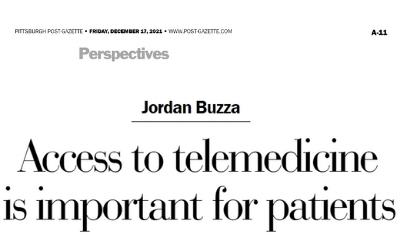Telemedicine has been a great step forward in creating safe, easy access to care.
Original Article Appears Here
In the last 18 months, how many of us have skipped visiting the doctor because we were worried about being exposed to COVID-19? Probably quite a few of us —– which is often not a good idea. Thankfully though, telemedicine was available throughout the pandemic so we could have access to care from the comfort of home and limit our potential exposure to COVID-19. This made receiving care safer, but also easier. Instead of having to take a few hours off work for a doctor’s appointment, possibly struggling with transportation and child care, patients could spend just a few minutes getting the care they needed from a doctor from their homes. Telemedicine has been a great step forward in creating safe, easy access to care.
So why weren’t we doing this before? The answer — state regulations and financial incentives. Medical professionals are licensed on a state-by-state basis. When the pandemic began, state regulations related to telemedicine were thankfully relaxed by emergency orders, making telemedicine widely available.
These emergency orders allowed doctors to practice telemedicine across state lines and also gave nurse practitioners and physician’s assistants more capability to serve via telemedicine. In our state, Gov. Tom Wolf and the Department of State issued similar orders to ensure that Pennsylvanians have access to telemedicine services. Whatever one thinks of our governor’s actions throughout the pandemic, the telemedicine orders clearly benefited Pennsylvanians.
Beyond the state orders, the federal government acted to ensure providers had incentives to allow telemedicine. Medicare rates often serve as a benchmark for how our health care system broadly operates, and the federal government was offering the same reimbursement rates for all visits for Medicare patients, whether in-person or via telemedicine.
Therefore, doctors had no financial incentive to favor one type of visit over the other.
Despite the numerous benefits of telemedicine and the many efforts that quickly went into making sure it was accessible, the state emergency orders allowing its practice are expiring. We are at risk of losing this beneficial, common-sense tool. Some orders have been extended, but there has been little movement on long-term solutions.
For example, Pennsylvania’s orders regarding telemedicine expire at the end of March, meaning we would all lose easy access to care. Furthermore, the federal government does not currently have a permanent solution or policy in place around telemedicine and Medicare, creating uncertainty across the marketplace.
We need to cut loose from the bureaucratic red-tape and remember the purpose of medicine is to help patients find healing. Our governments should embrace regulations and laws that improve access to care and which do not create perverse incentives for health care systems to charge patients more.
Of course, in-person care is very important. While technology can be helpful, some in-person visits are necessary, and they allow for a deeper connection between patient and doctor, which can help in the healing process.
But telemedicine is an important 21st century tool in the doctor’s bag.
Focusing on the good of patients means that we need common-sense regulation allowing doctors to cross state lines via telemedicine. It means allowing nurses and physician’s assistants to continue providing care they’ve been trained and certified to give. We also should not unnecessarily force patients into in-person visits so that all the different sides of the health care system can charge fees.
For us to help bring healing to patients, we need to make it as easy as possible for them to access care. If we are to put the good of patients above all else, we need to make sure there are sustainable, long-term solutions increasing access to telemedicine, here in Pennsylvania and across the country.
Jordan Buzza, of Green Tree, is director of CMF CURO, a Catholic health care ministry.

